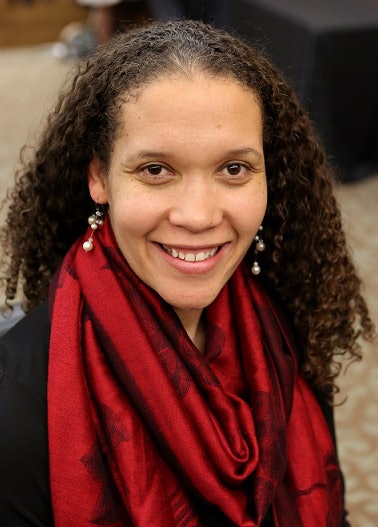Dr. Brighid Dwyer specializes in helping people talk to each other.
Not at each other or past each other, but across lines of division ranging from age, race and gender to religion, sexual orientation and political views. Teaching groups how to have productive, constructive conversations is key to her role as an assistant professor in communication and in education and counseling at Villanova University, and as director of the Program on Intergroup Relations in the university’s Office of Diversity and Inclusion.
The specialized program is uncommon in higher education, and Dwyer enjoys teaching students how to engage in open, respectful dialogue as a tool to building community and helping underrepresented students feel included in educational environments.
“Intergroup dialogue is really a wonderful program that I feel incredibly privileged to be a part of,” she says. “It’s about sharing stories and storytelling and making
 Dr. Brighid Dwyer
Dr. Brighid Dwyermeaning. We are so divided on many issues, and this is an intentional model for people to come together and talk and be civil.”
The model involves creation of a power-balanced space, whether a classroom experience or social interaction, where no one in a diverse group feels othered. Each person feels supported because participants have developed a deeper understanding of social identities and inequalities.
“A lot of times, we talk past one another and ignore one another, but we don’t talk to one another,” says Dwyer. “Intergroup dialogue allows people to create a new, shared meaning as an identity-based storytelling process that uses skills such as dialogic listening and listening for understanding rather than argument and debate.”
Before diversity was what Dwyer did, it was who she was – part of her biological and cultural DNA.
The Oakland, Calif., native says she grew up surrounded by examples of diversity, equity and inclusion. As a biracial child who attended racially diverse schools, she grew up in an ethnically diverse community in a home where her White single mother – an art teacher raised in Chicago – immersed her in spaces where she routinely interacted with people of different nationalities, same-sex couples and disabled individuals who communicated with sign language, ate with their feet and painted with brushes attached to helmets.
“My experience of diversity growing up wasn’t just race,” she says. “My mother was intentional about keeping me in a diverse environment as a salient part of my identity. It was ingrained in me from childhood.”
Those environments ranged from annual Kwanzaa celebrations at the home of an interracial couple and their children to participating on swim teams with well-heeled White athletes – and becoming skilled enough to compete in the Olympic trials in 2000.
Dwyer says she realized she wanted to be an educator while she was an undergraduate at the University of California, Los Angeles (UCLA). She was majoring in sociology and minoring in education when one of her professors, Dr. Walter Allen, decreed that she would pursue a Ph.D. and that he would author her letter of recommendation.
“I knew I wanted to be in an education field,” Dwyer recalls. “His mentorship really helped me figure out exactly what that path looked like for me.”
After graduating UCLA with her bachelor’s, she earned master’s and Ph.D. degrees at the University of Michigan. Along the way, she fell in love with minority serving institutions (MSIs). Later, her research centered on the experiences of minority students in higher education and strategies that promote justice and equity on campuses, with a specific focus on campus racial climates, access for underrepresented groups and the relational experiences of all students at MSIs, Hispanic serving institutions (HSIs) and historically Black colleges and universities (HBCUs).
Given the growing number of Latino students on campuses across the nation, intergroup dialogue is an important tool to help MSIs be welcoming and inclusive, Dwyer says.
“As HBCUs in particular, and MSIs overall, become more diverse, engaging in dialogue becomes incredibly important,” she says. “MSIs have to look at identity changes at the organizational and individual levels. This becomes complex as institutions consider their past identity and the current identity. They have to think about what it means to engage in conversations with students and alumni about changing identity, mission, goals, practices, and economic viability. These can be difficult conversations that are hard to have.”
Intergroup dialogue emerged from the work of social psychologists at the University of Michigan nearly three decades ago. It is rooted not just in sociology and psychology, but in intergroup work and community-organizing concepts that began in schools of social work.
Dwyer’s professional involvement in intergroup dialogue was sharpened working with academics such as Alecia Wartowski at Northwestern University’s Women’s Center, Dr. Sheryl Bowen and Dr. Terry Nance at Villanova and numerous experts in the field at Michigan.
This week, Princeton University announced that on Oct. 1, Dwyer will begin a new chapter as associate dean for Diversity and Inclusion in the Office of Campus Life at the Ivy League school. She’ll work with other diversity professionals across the campus to engage and support underrepresented students and “deepen their sense of belonging” – something research finds vital to retention and graduation.
“I’m excited to be part of what sounds like a movement at Princeton to really embody diversity and inclusiveness in an authentic way,” says Dwyer.
LaMont Jones can be reached at [email protected]















